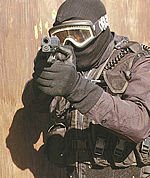
U.S. MNT To Participate in 2007 Copa America in Venezuela
This will be the first real test for the new coach, whomoever that might be. Go Juergen, go Juergen!
No fast U.S. shift on Iraq if Democrats win-Dean
This and the fact that Pelosi won't push for impeachment is so so disappointing. Of course assuming no votefraud or anything like that. Makes you realize that the Dems = Repubs for the most part. If Kerry had won, he wasn't gonna pull the troops. Go War! Rah Rah Rah!
WASHINGTON, Oct 29 (Reuters) - Even if Democrats win control of Congress in elections next week, an immediate change of course in Iraq policy is unlikely, the party's chairman said on Sunday.
WASHINGTON, Oct 29 (Reuters) - Even if Democrats win control of Congress in elections next week, an immediate change of course in Iraq policy is unlikely, the party's chairman said on Sunday.
Bush’s Martial Law Act of 2007

According to a press release from the office of Senator Patrick Leahy, however, the bill takes a “sizable step toward weakening states’ authority over their [National] Guard units, according to the congressional leaders who are leading the fight for Guard empowerment.” Leahey and senator Kit Bond, a Montana Republican, “said the conference agreement is expected to include a provision making it easier for the President to declare martial law, stripping state governors of part of their authority over state National Guard units in domestic emergencies. The provision is opposed by the National Governors Association and by key leaders in both the House and Senate.
Mexico's government resorts to force to end months of unrest in Oaxaca
As night fell, protesters decided to abandon the center and regroup at a local university. They pledged to continue their battle to get Gov. Ulises Ruiz to resign, even as police tore down the banners and tents in the center that had served for months as the headquarters of often violent demonstrations.
"We are going to leave this area ... while we regroup," said Daniel Reyes, one of the last of the protesters to leave the main square. He said they were retreating to "protect the safety" of the demonstrators.
"This is not a defeat, but rather a strengthening."
"We are going to leave this area ... while we regroup," said Daniel Reyes, one of the last of the protesters to leave the main square. He said they were retreating to "protect the safety" of the demonstrators.
"This is not a defeat, but rather a strengthening."
Mind Games Part II - To Hell and Back: Spinning the Downward Spiral
The same troops whose mental health issues were more or less ignored while they were active service members face numerous obstacles to proper care in the military's mental health system once they return. The barriers include a self-reporting process for mental health issues that is littered with disincentives for service members to self disclose; a post-deployment screening system that does not refer 78% of those who do come forward for further mental health evaluation; blizzards of paperwork for any service member seeking care; health care facilities that are already filled to capacity; and long, bureaucracy-filled waits for professional screening, diagnosis, treatment, and compensation.
America's Middle Class Has Become Globalization's Loser
At the beginning of the 21st century, the United States is still a superpower. But it's a superpower facing competition from beyond its borders as well as internal difficulties. Its lower and middle classes are turning out to be the losers of globalization.
There are essentially three exclusive characteristics whose simultaneous development have served as the foundations of the United States's success up until now -- and they only appear in this particular combination in America. They are not only the country's biggest strengths, but also its greatest weaknesses. It's worth scrutinizing them more closely.
There are essentially three exclusive characteristics whose simultaneous development have served as the foundations of the United States's success up until now -- and they only appear in this particular combination in America. They are not only the country's biggest strengths, but also its greatest weaknesses. It's worth scrutinizing them more closely.
Just Say It Ain't So.
BARTLETT: Well, Hannah, it’s never been a stay-the-course strategy. Strategically, we think it’s very important that we stay in Iraq and we win in Iraq. And if we were to cut and run and go and leave that country too early it would be a disaster for American policy.
And here's Dubya making the same claim:
http://thinkprogress.org/2006/10/22/bush-stay-the-course/
BUSH: Well, hey, listen, we’ve never been “stay the course,” George. We have been — we will complete the mission, we will do our job, and help achieve the goal, but we’re constantly adjusting to tactics. Constantly.
the new slogan..."WE WILL DO OUR JOB!" woo hoo!
And here's Dubya making the same claim:
http://thinkprogress.org/2006/10/22/bush-stay-the-course/
BUSH: Well, hey, listen, we’ve never been “stay the course,” George. We have been — we will complete the mission, we will do our job, and help achieve the goal, but we’re constantly adjusting to tactics. Constantly.
the new slogan..."WE WILL DO OUR JOB!" woo hoo!
Bush has used the Google!
HOST: I’m curious, have you ever googled anybody? Do you use Google?
BUSH: Occasionally. One of the things I’ve used on the Google is to pull up maps. It’s very interesting to see — I’ve forgot the name of the program — but you get the satellite, and you can — like, I kinda like to look at the ranch. It remind me of where I wanna be sometimes.
KEBMODEE: I'm mean, really, what a dumbass.
BUSH: Occasionally. One of the things I’ve used on the Google is to pull up maps. It’s very interesting to see — I’ve forgot the name of the program — but you get the satellite, and you can — like, I kinda like to look at the ranch. It remind me of where I wanna be sometimes.
KEBMODEE: I'm mean, really, what a dumbass.
Do ‘computer police' have too much power?

The Fourth Amendment of the United States Constitution states: “The right of the people to be secure in their persons, houses, papers and effects, against unreasonable searches and seizures, shall not be violated, and no warrant shall issue but upon probable cause...”
After Pat’s Birthday
By Kevin Tillman
Editor’s note: Kevin Tillman joined the Army with his brother Pat in 2002, and they served together in Iraq and Afghanistan. Pat was killed in Afghanistan on April 22, 2004. Kevin, who was discharged in 2005, has written a powerful, must-read document.
It is Pat’s birthday on November 6, and elections are the day after. It gets me thinking about a conversation I had with Pat before we joined the military. He spoke about the risks with signing the papers. How once we committed, we were at the mercy of the American leadership and the American people. How we could be thrown in a direction not of our volition. How fighting as a soldier would leave us without a voice… until we get out.
Much has happened since we handed over our voice:
Editor’s note: Kevin Tillman joined the Army with his brother Pat in 2002, and they served together in Iraq and Afghanistan. Pat was killed in Afghanistan on April 22, 2004. Kevin, who was discharged in 2005, has written a powerful, must-read document.
It is Pat’s birthday on November 6, and elections are the day after. It gets me thinking about a conversation I had with Pat before we joined the military. He spoke about the risks with signing the papers. How once we committed, we were at the mercy of the American leadership and the American people. How we could be thrown in a direction not of our volition. How fighting as a soldier would leave us without a voice… until we get out.
Much has happened since we handed over our voice:
Court Told It Lacks Power in Detainee Cases
Habeas corpus, a Latin term meaning "you have the body," is one of the oldest principles of English and American law. It requires the government to show a legal basis for holding a prisoner. A series of unresolved federal court cases brought against the administration over the last several years by lawyers representing the detainees had left the question in limbo.
Iraqi death toll withstands scrutiny
Iraqi death toll withstands scrutiny
Jim Giles
Conflict epidemiology study counts the cost of war.
It is one of the most politically charged questions that any researcher can tackle: how many people have died in Iraq since the US-led invasion?
Four public-health experts provided an answer last week. Their result — a death rate that has risen from 5.5 per thousand per year to 13.3 — implies that since the invasion there have been 650,000 'excess' deaths, 2.5% of the population. Predictably, the finding has met with criticism from supporters of the war from the US president downwards.
If it holds, the study will be a key publication in the growing field of conflict epidemiology. Understanding who is dying, how and where in Iraq is vital for efforts to rebuild the country. So once the political criticisms are set aside, how does the study stack up scientifically?
The uncertainty of figures relating to before the war, and the present security situation, hamper efforts to estimate the Iraqi death rate.
Estimates of deaths in Iraq all suggest that the death rate has risen since the invasion. But they have been much lower than the latest figure. Iraq Body Count, a left-leaning website that compiles deaths from media reports, quotes a maximum of just under 49,000. US government officials have given figures of 30,000–50,000. And a household survey, conducted in May 2004 by the United Nations and published last year, concluded that the war had caused at least 18,000–29,000 deaths, mostly from violent causes. The only previous estimate of the same order of magnitude is a figure of around 100,000 excess deaths in the first 18 months of the conflict, published in 2004 by Gilbert Burnham and his colleagues at Johns Hopkins University in Baltimore (L. Roberts et al. Lancet 364, 1857–1864; 2004), the same researchers who are behind the new work.
The authors say their estimate is so much higher because their methodology is more comprehensive. They organized detailed interviews, carried out by Iraqi researchers from the Al Mustansiriya University in Baghdad, in more than 1,800 households in 16 of Iraq's 18 administrative regions. Using random sampling similar to that used in political opinion polls, they documented 82 deaths in the period before the invasion, and 547 during the conflict. More than 90% of these were confirmed by death certificates. They show a 95% probability that the death toll has been between 390,000 and 940,000, most of which were due to violence such as gunshots (G. Burnham et al. Lancet doi:10.1016/S0140-6736(06)69491-9; 2006).
Data from other conflicts show that such sampling is much more accurate than media reports, which usually account for no more than 20% of deaths. "Random counts force you to go to places that aren't convenient," says Jana Asher, a researcher with the Science and Human Rights Program of the American Association for the Advancement of Science in Washington DC. "The media don't wander off to distant locations. It's a very different type of data collection."
Random counts force you to go to places that aren't convenient. The media don't wander off to distant locations.
Death tolls from Iraqi health officials, the source of US government figures, are also suspect. The Johns Hopkins team says that the process for issuing death certificates still works well in Iraq, but the system for monitoring the number of certificates issued does not. Even before the war, note the researchers, the government's surveillance system captured only one-third of all deaths.
Yet despite the weakness of other measurements, the new figure has still surprised researchers. Perhaps the most significant concern is the baseline rate for pre-invasion death rates used in the new study. The latest survey, which included questions about the situation before the invasion, put this at 5.5 deaths per 1,000 people per year, in line with figures on Iraq from the US Census Bureau. Iran, which has a well-run health system, has a similar rate, but Iraq was at the time suffering from years of sanctions. Some sources, including the United Nations Population Division, list a pre-invasion figure of 9.7.
The discrepancy does not invalidate the new result, and if the researchers underestimated the pre-war death rate, it's possible that they may have also underestimated the post-war rate. But some researchers say the paper should have addressed the issue. "There should have been more introspection," says Beth Osborne Daponte, a demographer at Carnegie Mellon University in Pittsburgh, Pennsylvania. "That increased my discomfort."
Other researchers share that discomfort. Debarati Guha-Sapir is director of the Centre for Research on the Epidemiology of Disasters in Brussels. She has some methodological concerns about the paper, including the use of local people — who might have opposed the occupation — as interviewers. She also points out that the result does not fit with any she has recorded in 15 years of studying conflict zones. Even in Darfur, where armed groups have wiped out whole villages, she says that researchers have not recorded the 500 predominately violent deaths per day that the Johns Hopkins team estimates are occurring in Iraq.
But overall Guha-Sapir says the paper contains the best data yet on the mortality rate in Iraq. And none of the experts contacted by Nature said that their doubts fatally undermined the study. Some, such as Daponte, would have liked the authors to have better assessed their method's shortcomings before releasing a result with such political impact. But most say the result is a welcome addition to conflict epidemiology, which is now seen as playing a central role in assessing the severity of wars, and in helping states recover from them (see 'Counting the cost of war').
Burnham says he would now like to study patterns of migration in Iraq and the state of the health system. He would also like to estimate deaths based on a sample 4–5 times bigger than that used so far. But survey teams are in danger on the streets of Iraqi towns, and Burnham doubts whether the need for more detailed data justifies the risk.
Jim Giles
Conflict epidemiology study counts the cost of war.
It is one of the most politically charged questions that any researcher can tackle: how many people have died in Iraq since the US-led invasion?
Four public-health experts provided an answer last week. Their result — a death rate that has risen from 5.5 per thousand per year to 13.3 — implies that since the invasion there have been 650,000 'excess' deaths, 2.5% of the population. Predictably, the finding has met with criticism from supporters of the war from the US president downwards.
If it holds, the study will be a key publication in the growing field of conflict epidemiology. Understanding who is dying, how and where in Iraq is vital for efforts to rebuild the country. So once the political criticisms are set aside, how does the study stack up scientifically?
The uncertainty of figures relating to before the war, and the present security situation, hamper efforts to estimate the Iraqi death rate.
Estimates of deaths in Iraq all suggest that the death rate has risen since the invasion. But they have been much lower than the latest figure. Iraq Body Count, a left-leaning website that compiles deaths from media reports, quotes a maximum of just under 49,000. US government officials have given figures of 30,000–50,000. And a household survey, conducted in May 2004 by the United Nations and published last year, concluded that the war had caused at least 18,000–29,000 deaths, mostly from violent causes. The only previous estimate of the same order of magnitude is a figure of around 100,000 excess deaths in the first 18 months of the conflict, published in 2004 by Gilbert Burnham and his colleagues at Johns Hopkins University in Baltimore (L. Roberts et al. Lancet 364, 1857–1864; 2004), the same researchers who are behind the new work.
The authors say their estimate is so much higher because their methodology is more comprehensive. They organized detailed interviews, carried out by Iraqi researchers from the Al Mustansiriya University in Baghdad, in more than 1,800 households in 16 of Iraq's 18 administrative regions. Using random sampling similar to that used in political opinion polls, they documented 82 deaths in the period before the invasion, and 547 during the conflict. More than 90% of these were confirmed by death certificates. They show a 95% probability that the death toll has been between 390,000 and 940,000, most of which were due to violence such as gunshots (G. Burnham et al. Lancet doi:10.1016/S0140-6736(06)69491-9; 2006).
Data from other conflicts show that such sampling is much more accurate than media reports, which usually account for no more than 20% of deaths. "Random counts force you to go to places that aren't convenient," says Jana Asher, a researcher with the Science and Human Rights Program of the American Association for the Advancement of Science in Washington DC. "The media don't wander off to distant locations. It's a very different type of data collection."
Random counts force you to go to places that aren't convenient. The media don't wander off to distant locations.
Death tolls from Iraqi health officials, the source of US government figures, are also suspect. The Johns Hopkins team says that the process for issuing death certificates still works well in Iraq, but the system for monitoring the number of certificates issued does not. Even before the war, note the researchers, the government's surveillance system captured only one-third of all deaths.
Yet despite the weakness of other measurements, the new figure has still surprised researchers. Perhaps the most significant concern is the baseline rate for pre-invasion death rates used in the new study. The latest survey, which included questions about the situation before the invasion, put this at 5.5 deaths per 1,000 people per year, in line with figures on Iraq from the US Census Bureau. Iran, which has a well-run health system, has a similar rate, but Iraq was at the time suffering from years of sanctions. Some sources, including the United Nations Population Division, list a pre-invasion figure of 9.7.
The discrepancy does not invalidate the new result, and if the researchers underestimated the pre-war death rate, it's possible that they may have also underestimated the post-war rate. But some researchers say the paper should have addressed the issue. "There should have been more introspection," says Beth Osborne Daponte, a demographer at Carnegie Mellon University in Pittsburgh, Pennsylvania. "That increased my discomfort."
Other researchers share that discomfort. Debarati Guha-Sapir is director of the Centre for Research on the Epidemiology of Disasters in Brussels. She has some methodological concerns about the paper, including the use of local people — who might have opposed the occupation — as interviewers. She also points out that the result does not fit with any she has recorded in 15 years of studying conflict zones. Even in Darfur, where armed groups have wiped out whole villages, she says that researchers have not recorded the 500 predominately violent deaths per day that the Johns Hopkins team estimates are occurring in Iraq.
But overall Guha-Sapir says the paper contains the best data yet on the mortality rate in Iraq. And none of the experts contacted by Nature said that their doubts fatally undermined the study. Some, such as Daponte, would have liked the authors to have better assessed their method's shortcomings before releasing a result with such political impact. But most say the result is a welcome addition to conflict epidemiology, which is now seen as playing a central role in assessing the severity of wars, and in helping states recover from them (see 'Counting the cost of war').
Burnham says he would now like to study patterns of migration in Iraq and the state of the health system. He would also like to estimate deaths based on a sample 4–5 times bigger than that used so far. But survey teams are in danger on the streets of Iraqi towns, and Burnham doubts whether the need for more detailed data justifies the risk.
'Beginning of the End of America'
We have lived as if in a trance.
We have lived as people in fear.
And now—our rights and our freedoms in peril—we slowly awake to learn that we have been afraid of the wrong thing.
Therefore, tonight have we truly become the inheritors of our American legacy.
For, on this first full day that the Military Commissions Act is in force, we now face what our ancestors faced, at other times of exaggerated crisis and melodramatic fear-mongering:
A government more dangerous to our liberty, than is the enemy it claims to protect us from.
We have lived as people in fear.
And now—our rights and our freedoms in peril—we slowly awake to learn that we have been afraid of the wrong thing.
Therefore, tonight have we truly become the inheritors of our American legacy.
For, on this first full day that the Military Commissions Act is in force, we now face what our ancestors faced, at other times of exaggerated crisis and melodramatic fear-mongering:
A government more dangerous to our liberty, than is the enemy it claims to protect us from.
Christian Rock Band Cleans Up Hotel Room
"The television was lifted up, dusted under, Windexed, and placed carefully back in the cabinet. Plus they apparently had our towels professionally laundered at their own expense. There's nothing in the manual about dealing with this type of propriety." Hotel staff are attempting to contact Ruggid Krøss' manager to return the six extra Gideon's Bibles they left in the suite's nightstands.
118 ununoctium

In the latest experiments, scientists at the Lawrence Livermore National Laboratory in California and the Joint Institute for Nuclear Research in Dubna, Russia, bombarded californium with calcium ions to create 118 — the heaviest ever created in such experiments. Scientists said they found their first superheavy element 118 atom in 2002, then found another two atoms in 2005 in a second round of experiments in which they fired 10 to the power of 19 calcium ions at the californium. In the end the atoms of element 118 — also known as ununoctium — lasted 0.9 milliseconds, researchers said.
General seeks UK Iraq withdrawal
The head of the British Army has said the presence of UK armed forces in Iraq "exacerbates the security problems".
In an interview in the Daily Mail, Sir Richard Dannatt, Chief of the General Staff, is quoted as saying the British should "get out some time soon".
In an interview in the Daily Mail, Sir Richard Dannatt, Chief of the General Staff, is quoted as saying the British should "get out some time soon".
Flying the flag
I don't know what the viewing figures on national TVE1 were on Saturday evening, but truth be told, the game was partially eclipsed by a match scheduled for the next day in the Camp Nou, between Catalonia and Euskadi (The Basque Country).
Several of the star turns were missing in action, of course, flying home from Sweden. Xavi, Puyol, Lluis Garcia, Cesc, Reina and Xabi Alonso have all played for their respective 'national' sides before, but always in the traditional Christmas matches, when teams from any of Spain's 17 autonomous communities can invite a national team over for a festive friendly.
Several of the star turns were missing in action, of course, flying home from Sweden. Xavi, Puyol, Lluis Garcia, Cesc, Reina and Xabi Alonso have all played for their respective 'national' sides before, but always in the traditional Christmas matches, when teams from any of Spain's 17 autonomous communities can invite a national team over for a festive friendly.
Quote of the Day
"Part of empire is the way it's penetrated our society, the way we've become dependent on it… The military budget is starting to bankrupt the country. It's got so much in it that's well beyond any rational military purpose. It equals just less than half of total global military spending. And yet here we are, stymied by two of the smallest, poorest countries on Earth. Iraq before we invaded had a GDP the size of the state of Louisiana, and Afghanistan was certainly one of the poorest places on the planet. And yet these two places have stopped us."
Chalmers Johnson
Grazie Coop!
Chalmers Johnson
Grazie Coop!
Oaxaca demo reaches Mexico City
Damn, how far is it from Oaxaca to Mexico City? By the way, this is my 500th post!
Thousands of protesters from Oaxaca have marched to Mexico City to demand their state governor's resignation.
They accuse Ulises Ruiz, governor of the southern state, of rigging elections and using brutal forced to put down protests.
Thousands of protesters from Oaxaca have marched to Mexico City to demand their state governor's resignation.
They accuse Ulises Ruiz, governor of the southern state, of rigging elections and using brutal forced to put down protests.
Jeb Bush gets rude welcome
By now, Mr. Bush was cornered. He was surrounded by signs that said "Pittsburgh is a Santorum Free Zone," "Honk if you're sick of Rick," and a crowd growing increasingly louder, according to Mr. Vandenburgh.
"We don't want you here," protesters chanted.
Port Authority spokesman Bob Grove said six or seven officers responded to the scene to control the crowds.
He said Mr. Bush had been walking in the area near the T-station and the incident happened spontaneously when about 50 pickets "tailed him and stayed with him and went into the Wood Street station."
About 75 protesters remained on the street, said Mr. Grove.
He said the crowd was asked repeatedly to disperse.
Mr. Grove said a Port Authority canine unit was called in to help with crowd control. Two officers used their tasers to stun two protesters who "were asked to leave, but did not go," Mr. Grove said.
The tasers he said were empty of the cartridges that supply a more powerful charge.
"It was a very tense situation. They were very close to the governor and shouting on top of him."
As a precaution, the governor was ushered into a T-station supply closet and stayed there until the crowd left.
"We don't want you here," protesters chanted.
Port Authority spokesman Bob Grove said six or seven officers responded to the scene to control the crowds.
He said Mr. Bush had been walking in the area near the T-station and the incident happened spontaneously when about 50 pickets "tailed him and stayed with him and went into the Wood Street station."
About 75 protesters remained on the street, said Mr. Grove.
He said the crowd was asked repeatedly to disperse.
Mr. Grove said a Port Authority canine unit was called in to help with crowd control. Two officers used their tasers to stun two protesters who "were asked to leave, but did not go," Mr. Grove said.
The tasers he said were empty of the cartridges that supply a more powerful charge.
"It was a very tense situation. They were very close to the governor and shouting on top of him."
As a precaution, the governor was ushered into a T-station supply closet and stayed there until the crowd left.
EL MONSTRUO

"One of them was this gigantic monster, with vertebrae the size of dinner plates and teeth the size of cucumbers," Joern Hurum, an assistant professor at the University of Oslo, told Reuters today.
"We believe the skeleton is intact and that it's about 10 meters long," he told Reuters of the pliosaur, a type of plesiosaur with a short neck and massive skull. The team dubbed the specimen "The Monster."
Retired S1Ws Recalled To Active Duty

STRONG ISLAND, NY—With recruitment down sharply, and the prospect of being held back by the nation of millions appearing once again likely, top-ranking Public Enemy officials issued an order Monday for all retired Security Of The First World personnel to return to active duty.
"In order to come to the aid of the hip-hop nation, we must regrettably ask those men who heroically served the Black Planet to once again don their fatigues and take up their plastic arms," S1W Chief and Public Enemy Minister Of Information Professor Griff said. "We have no more options. It's not as though we can simply call 911. That would be a joke."
Massive Attack Show Last Night

Saw Massive Attack last night at Roseland. Great venue, good show and lots of hipsters all around the place. The music was best when they were thumping the bass at full volume. Liz Fraser from the Cocteau Twins and Horace Andy (http://en.wikipedia.org/wiki/Horace_Andy) on vocals for many tracks and they were both fantastic. Last tune really rocked.
Time Warner Gives Bush-Bashing Comic the Hook
Is Time Warner getting into the censorship business? A host of Showtime at the Apollo claims he got the hook for angering top brass at the media megaconglomerate with jokes about President George W. Bush.
Comic Paul Mooney (most recently of Chappelle's Show) was midway through a taping of the famed Harlem theater's weekly variety show when the plug was abruptly pulled. Mooney claims the show's producer, Suzanne de Passe, told him material in his monologue had offended unnamed officials from Time Warner, whose chairman, Richard Parsons, heads the Apollo Theater Foundation's board of directors and is among the country's most prominent black Republicans. De Passe was traveling and unreachable for comment, but a Time Warner spokeswoman called the story "ridiculous." "It's absolutely untrue" that the company had anything to do with the incident, she says, noting that Parsons was out of the country at the time.
Mooney, however, seems certain who shut him down. "They wanted me out of there, the Republicans, the Time Warner people," he says. "They said I was Bush bashing, and it was hatred. I felt like I was in Iran or Cuba or somewhere."
After everything that's been said about Bush at this point, how did Mooney manage to provoke such a harsh response? "I talked about his little drunk daughters, Gin and Juice," he says, referring to Jenna and Barbara Bush. "I talked about his mother, who looks like the man on the oatmeal box." Mooney also did a bit on how the letters in Bush's name can be manipulated to produce the number 666, proving Venezuelan president Hugo Chavez's recent claim that Bush is the devil.
"The audience went crazy for that," he says.
Comic Paul Mooney (most recently of Chappelle's Show) was midway through a taping of the famed Harlem theater's weekly variety show when the plug was abruptly pulled. Mooney claims the show's producer, Suzanne de Passe, told him material in his monologue had offended unnamed officials from Time Warner, whose chairman, Richard Parsons, heads the Apollo Theater Foundation's board of directors and is among the country's most prominent black Republicans. De Passe was traveling and unreachable for comment, but a Time Warner spokeswoman called the story "ridiculous." "It's absolutely untrue" that the company had anything to do with the incident, she says, noting that Parsons was out of the country at the time.
Mooney, however, seems certain who shut him down. "They wanted me out of there, the Republicans, the Time Warner people," he says. "They said I was Bush bashing, and it was hatred. I felt like I was in Iran or Cuba or somewhere."
After everything that's been said about Bush at this point, how did Mooney manage to provoke such a harsh response? "I talked about his little drunk daughters, Gin and Juice," he says, referring to Jenna and Barbara Bush. "I talked about his mother, who looks like the man on the oatmeal box." Mooney also did a bit on how the letters in Bush's name can be manipulated to produce the number 666, proving Venezuelan president Hugo Chavez's recent claim that Bush is the devil.
"The audience went crazy for that," he says.
Clerk asked to look into report of Foley incident at page's dorm
A senior House Republican has asked the House clerk to look into allegations that then-Rep. Mark Foley was turned away from the congressional page dorm on Capitol Hill after arriving there intoxicated one night.
this dude was desperate...
this dude was desperate...
U.S. to receive invitation to Copa America

LOS ANGELES (AP) - The United States will receive a formal invitation to Copa America within 24 hours and will decide by the end of the month whether to play in South America's nations championship, U.S. Soccer Federation president Sunil Gulati said Tuesday.
Greatest Pool Shot Ever
This is the final match of the 1995 Sands Regency Classic. The score is 12-12 in a race to 13 for $10,000. Efren "The Magician" Reyes tries to put a safety on Earl "The Pearl" Strickland but it backfires. What comes next is the greatest shot in pool history - the Z kick.
Middle-class families in worse shape than ever, study finds
WASHINGTON (Reuters) -- The typical double-income family is worse off financially than ever, a study released Thursday said, warning that few Americans have saved enough to brace for financial setbacks.
Subscribe to:
Comments (Atom)





